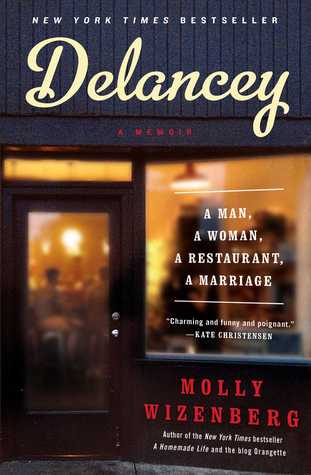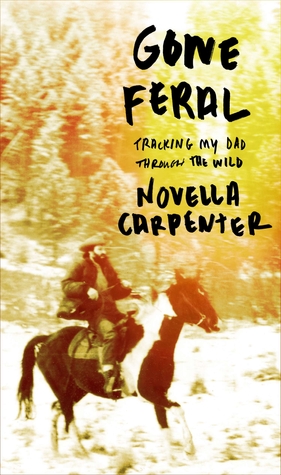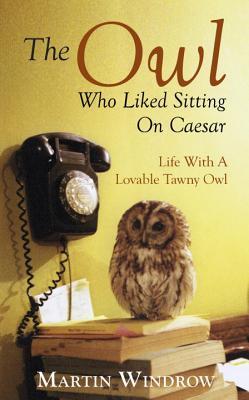
Delancey: a man, a woman, a restaurant, a marriage by Molly Wizenburg
Molly Wizenberg's husband, Brandon Pettit, was always becoming interested in a unique topic or interest and then dropping it for the next one he comes across. So when he says he wants to open a pizza restaurant she thinks this is just another passing interest that will get dropped for the next thing, except it doesn't. Soon Brandon is signing a lease on a space and Molly is helping him renovate it to get it ready for the restaurant.Delancey is the story of Brandon's pizza restaurant of the same name, but it's also about how Molly had to learn to adapt to life as the wife of a restaurant chef (long, long hours most days), and how she came to understand who she truly is and who her husband truly is. He is great at running the restaurant and as much as she wanted to help and loves to cook - Molly is not cut out to be a restaurant line cook, that's just not who she is. Once she worked through all this she could finally enjoy Delancey for what it is and what it means to her husband. I admire Molly's honesty in this book about her mixed feelings about the restaurant and about her process for dealing with it and learning from it. This is a great book for any foodie readers out there. I loved Molly's first book A Homemade Life and I loved this one too! She also includes a few recipes either from the restaurant or just some of her favorites. I actually read this book in one day flying home from vacation - it's a quick, enjoyable read that will make you want to go grab a slice of pizza at your local pizza restaurant.

Real Food: what to eat and why by Nina Planck
I was so excited to read this book after reading Planck's cookbook The Real Food Cookbook, but it was kind of a let down. While I completely agree with everything she says about how real, traditional food is better for you than processed food, the book was very, very scientific and just had way too much statistics and facts bogging you down. While some of that is necessary in a book like this I just felt like it was so much science and data that it just became a chore to keep reading it. I really wanted to like it because I think she has a great message and obviously a LOT of data to back up her points, but it wasn't very interesting and engaging for me. I would still recommendThe Real Food Cookbook and eating a more traditional, real food diet that supports local farmers in your area.
A few quotes I liked:
"When a raw milk ban was proposed in New York City in 1907, a coalition of doctors, social workers, and milk distributors defeated it, arguing that safe milk should be guaranteed by inspectors, not pasteurization. In 1908, however, a panel of experts appointed by President Theodore Roosevelt concluded that raw milk itself was to blame for food-borne illness. That was the final blow. In 1914, New York required pasteurization of milk for sale in shops. Other states followed suit, and by 1949, pasteurization was the law in most places." (p. 73)
"The Journal of Dairy Science reported that 30 to 80 percent of conventional cattle carry E. coli in their stomachs, but when cattle were switched from a high-corn diet to hay, E. coli declined a thousandfold in only five days. In other words, a mere five days of feeding grass and hay to beef cattle before slaughter will restore the stomach to its normal acidity and kill E. coli, which would prevent many cases of contamination in the slaughterhouse. Unfortunately, this sensible, inexpensive practice has not been widely adopted by feedlots." (p. 102) [This is why you should support your local farmer for all your meat!]
"But there are some questions about vitamin supplements. The results of trials with supplements isolated from whole foods range from unhelpful (smokers taking beta-carotene had higher rates of lung cancer) to promising (vitamin E prevents second heart attacks) to merely equivocal (another vitamin E study on heart disease showed no effect). However, studies consistently find that diets rich in antioxidants from whole foods lower risk of heart disease and cancer." (p. 161)
"One dogged researcher, Mary Enig, helped to get the word out. The author of Know Your Fats, Enig waged an often lonely battle. I'm afraid her efforts were not always welcomed with bouquets of roses. In 1978, Enig wrote a scientific paper challenging a government report blaming saturated fat for cancer, in which she pointed out that the data actually showed a link with trans fats. Not long after, 'two guys from the Institute of Shortening and Edible Oils - the trans fat lobby, basically - visited me, and boy, were they angry.' Enig told Gourmet magazine. 'They said they'd been keeping a careful watch to prevent articles like mine from coming out and didn't know how this horse had gotten out of the barn'." (p. 201)
A few quotes I liked:
"When a raw milk ban was proposed in New York City in 1907, a coalition of doctors, social workers, and milk distributors defeated it, arguing that safe milk should be guaranteed by inspectors, not pasteurization. In 1908, however, a panel of experts appointed by President Theodore Roosevelt concluded that raw milk itself was to blame for food-borne illness. That was the final blow. In 1914, New York required pasteurization of milk for sale in shops. Other states followed suit, and by 1949, pasteurization was the law in most places." (p. 73)
"The Journal of Dairy Science reported that 30 to 80 percent of conventional cattle carry E. coli in their stomachs, but when cattle were switched from a high-corn diet to hay, E. coli declined a thousandfold in only five days. In other words, a mere five days of feeding grass and hay to beef cattle before slaughter will restore the stomach to its normal acidity and kill E. coli, which would prevent many cases of contamination in the slaughterhouse. Unfortunately, this sensible, inexpensive practice has not been widely adopted by feedlots." (p. 102) [This is why you should support your local farmer for all your meat!]
"But there are some questions about vitamin supplements. The results of trials with supplements isolated from whole foods range from unhelpful (smokers taking beta-carotene had higher rates of lung cancer) to promising (vitamin E prevents second heart attacks) to merely equivocal (another vitamin E study on heart disease showed no effect). However, studies consistently find that diets rich in antioxidants from whole foods lower risk of heart disease and cancer." (p. 161)
"One dogged researcher, Mary Enig, helped to get the word out. The author of Know Your Fats, Enig waged an often lonely battle. I'm afraid her efforts were not always welcomed with bouquets of roses. In 1978, Enig wrote a scientific paper challenging a government report blaming saturated fat for cancer, in which she pointed out that the data actually showed a link with trans fats. Not long after, 'two guys from the Institute of Shortening and Edible Oils - the trans fat lobby, basically - visited me, and boy, were they angry.' Enig told Gourmet magazine. 'They said they'd been keeping a careful watch to prevent articles like mine from coming out and didn't know how this horse had gotten out of the barn'." (p. 201)

Lost Girls: an Unsolved American Mystery by Robert Kolker
I wanted to read this book after watching the Disappeared episode with Shannon Gilbert - the investigation into her disappearance is what uncovered 10 bodies buried in Long Island that are most likely the work of more than one serial killer. While officials don't think Shannon was the victim of a serial killer - like the other identified victims she was a prostitute who marketed herself on Craigslist. In Lost Girls Kolker explores the backgrounds of Shannon and the first four victims discovered on Long Island - Maureen Brainard-Barnes, Melissa Barthelemy, Megan Waterman, and Amber Lynn Costello. All these women had hard lives that led them to a life of drugs and prostitution, but that's not to say they weren't missed by their friends and family. If anything good came from any of this it's that a few of their friends who were also prostitutes decided to get legitimate jobs after their friend was murdered - one said she'd rather be broke than dead. Kolker does a great job of really digging into these women's lives and families. He also explores a few of the main theories about the serial killer(s) and whether they are local Long Island residents.
Obviously this is a sad book about women working as prostitutes who were killed by a serial killer, so some of it is hard to read because their lives were very hard and terrible. My only complaint was that the very end of the book got into more of the in-fighting between Shannon Gilbert's mother Mari and some of the other victim's families. At first they all came together to support each other, but over the years Mari alienated many of the other family members and while it is relevant it also felt like drama and gossip that could have been left out. Also, because these murders are still unsolved it's a little bit of a let down at the end that the case is still open. Overall, it was a very interesting book and it definitely made me appreciate my own life and family a lot more!
Obviously this is a sad book about women working as prostitutes who were killed by a serial killer, so some of it is hard to read because their lives were very hard and terrible. My only complaint was that the very end of the book got into more of the in-fighting between Shannon Gilbert's mother Mari and some of the other victim's families. At first they all came together to support each other, but over the years Mari alienated many of the other family members and while it is relevant it also felt like drama and gossip that could have been left out. Also, because these murders are still unsolved it's a little bit of a let down at the end that the case is still open. Overall, it was a very interesting book and it definitely made me appreciate my own life and family a lot more!

Gone Feral: Tracking My Dad Through the Wild by Novella Carpenter
I read and liked Novella Carpenter's previous book Farm Cityabout her and her boyfriend farming on an abandoned lot beside their apartment building in Oakland, CA. So, I was excited to read this one about her relationship with her father. When Novella gets a phone call that her dad is missing, as in an official missing person, she freaks out and tries to find him. Soon he reaches out to her (he had just gone out of town without telling anyone), but she realizes that her father is getting older and now is the time to re-establish a relationship with him. Her father wasn't in her life much growing up and the few adult interactions with her dad hadn't been great. After he went missing she visits him and quickly realizes that he's not just a hermit who likes living a simple life in the wilderness, but very likely he's mentally ill. Novella has to work through the idealized image she had of her father with the reality - especially as she is trying to get pregnant with her first child. Novella also has to explore traits of her father that she has and what that might mean for her future as well.
This is an honest memoir of a daughter trying to work out her relationship with her difficult father. It wasn't as apparent (as least from what I remember) in Farm City that she is basically living in poverty, although it seems by choice - apparently that runs in the family as well. I'm far from wealthy myself, but her whole family seemed to be living hand-to-mouth, but on purpose which seems so bizarre to me. It was interesting, if somewhat sad, but in the end she does have hope for her future and she's made peace with her relationship with her father too.
This is an honest memoir of a daughter trying to work out her relationship with her difficult father. It wasn't as apparent (as least from what I remember) in Farm City that she is basically living in poverty, although it seems by choice - apparently that runs in the family as well. I'm far from wealthy myself, but her whole family seemed to be living hand-to-mouth, but on purpose which seems so bizarre to me. It was interesting, if somewhat sad, but in the end she does have hope for her future and she's made peace with her relationship with her father too.

The Owl Who Liked Sitting on Caesar by Martin Windrow
Martin Windrow became fascinated with owls after his older brother got into falconry and also kept a pet Tawney Owl. After one failed attempt with a Little Owl who never bonded with Windrow and escaped, he adopts Mumble a Tawney Owl. Mumble was hatched in captivity and came to Windrow a few weeks after birth. They bonded instantly and living with Mumble would completely change Windrow's life. The personal aspects of the book about Windrow and Mumble's activities was very interesting, but there was a lot of general information about owls and it seemed like too much to me. Obviously you need some background about owls for a story like this, but there were whole chapters just on owl history, biology, etc. that I could have done without. Windrow also mentions that after the first year or so Mumble no longer tolerated visitors well - she would attack them unless Windrow put her into her cage. He never really talked about how that affected his social life, which I'm sure it did in a big way. Overall, it had interesting parts, but it wasn't great. I liked Wesley the Owl by Stacey O'Brien much better.

Eating Wildly: Foraging for Life, Love and the Perfect Meal by Ava Chin
Ava Chin is approaching 40 and is still single, her beloved grandmother is dying, she struggles with her relationship with her Mom, and her relationship with her Dad is non-existent. To deal with all this she escapes into foraging for wild food in New York City. She even lands a column in The New York Timeswriting about being an "urban forager." In foraging for wild food Ava learns how to navigate the tough circumstances she's dealing with - and later her foraging even leads, finally, to true love.
This was a quick read that was interesting. Chin's personal stories/problems don't overwhelm the book and each chapter also includes a recipe using wild food. I did like it, but it wasn't fantastic. Since it was such a quick read I would recommend it to anyone interested in foraging or food issues.
This was a quick read that was interesting. Chin's personal stories/problems don't overwhelm the book and each chapter also includes a recipe using wild food. I did like it, but it wasn't fantastic. Since it was such a quick read I would recommend it to anyone interested in foraging or food issues.


